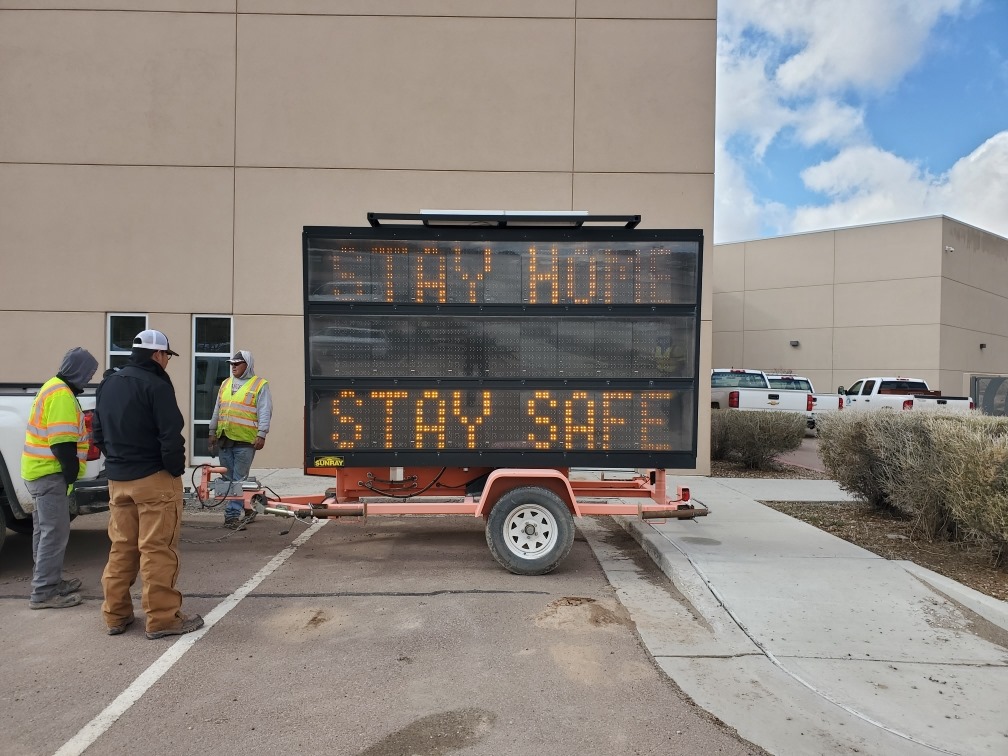
- Details
- By Native News Online Staff
WINDOW ROCK, Ariz. — The president of the Navajo Nation is asking Navajo citizens on the nation’s largest Indian reservation to stay home over the Christmas holiday to stop the further spread of Covid-19.
“This Christmas, please do not gather in person with anyone outside of your immediate household due to the risk of spreading Covid-19. The incubation period for the virus makes it very difficult to detect if someone has Covid-19 and some people don’t experience any symptoms but are still able to spread it to others. Please be safe and plan ahead for the holidays,” Navajo Nation President Jonathan Nez said.
The president’s plea came as 157 new Covid-19 positive cases were announced on Wednesday.
The total number of deaths remains at 755 as of Wednesday. Reports indicate that 11,292 individuals have recovered from Covid-19, and 195,438 Covid-19tests have been administered. The total number of positive Covid-19 cases is now 21,513.
Navajo Nation Covid-19 positive cases by Service Unit:
- Chinle Service Unit: 4,083
- Crownpoint Service Unit: 2,251
- Ft. Defiance Service Unit: 2,255
- Gallup Service Unit: 3,542
- Kayenta Service Unit: 2,065
- Shiprock Service Unit: 3,614
- Tuba City Service Unit: 2,305
- Winslow Service Unit: 1,376
* 22 residences with Covid-19 positive cases are not specific enough to place them accurately in a Service Unit.
On Wednesday, the state of Arizona reported 6,058 new cases, Utah reported 2,612, and New Mexico reported 1,174 new cases. The Navajo Nation remains in a three-week lockdown that requires all residents to remain home at all times with the exception of essential workers that are required to report to work, cases of emergencies, and to obtain essential items such as food, water, and medication.
“We now have the Pfizer and Moderna vaccines that are being administered to our frontline health care workers here on the Navajo Nation. This does not mean that we let up and become complacent. Instead, we have to do even better and keep fighting this potentially deadly virus together,” Nez said.
The Nez-Lizer team along with Miss Navajo Nation Shaandiin Parrish distributed turkeys and other items to health care workers at Tuba City Regional Health Care Center and Shonto, Arizona, to help families stay safe and healthy during the holidays.
On Thursday, Dec. 24 at 10:00 a.m. (MST), the Nez-Lizer Administration will host an online town hall on the Nez-Lizer Facebook page to provide additional updates. They will be joined by Pfizer CEO Dr. Albert Bourla, who will provide information about the Pfizer vaccine.
For more information, including helpful prevention tips, and resources to help stop the spread of Covid-19, visit the Navajo Department of Health's Covid-19 website: http://www.ndoh.navajo-nsn.gov/COVID-19.
For Covid-19 related questions and information, call (928) 871-7014.
More Stories Like This
Native News Weekly (August 25, 2024): D.C. BriefsUS Presidents in Their Own Words Concerning American Indians
NDAA passes House; Lumbee Fairness Act Advances
NFL, Vikings to Host Native All-American Game, Youth Flag Clinic
Senate Committee on Indian Affairs Passes 12 Bills to Strengthen Tribal Communities
Help us defend tribal sovereignty.
At Native News Online, our mission is rooted in telling the stories that strengthen sovereignty and uplift Indigenous voices — not just at year’s end, but every single day.
Because of your generosity last year, we were able to keep our reporters on the ground in tribal communities, at national gatherings and in the halls of Congress — covering the issues that matter most to Indian Country: sovereignty, culture, education, health and economic opportunity.
That support sustained us through a tough year in 2025. Now, as we look to the year ahead, we need your help right now to ensure warrior journalism remains strong — reporting that defends tribal sovereignty, amplifies Native truth, and holds power accountable.
 The stakes couldn't be higher. Your support keeps Native voices heard, Native stories told and Native sovereignty defended.
The stakes couldn't be higher. Your support keeps Native voices heard, Native stories told and Native sovereignty defended.
Stand with Warrior Journalism today.
Levi Rickert (Potawatomi), Editor & Publisher

